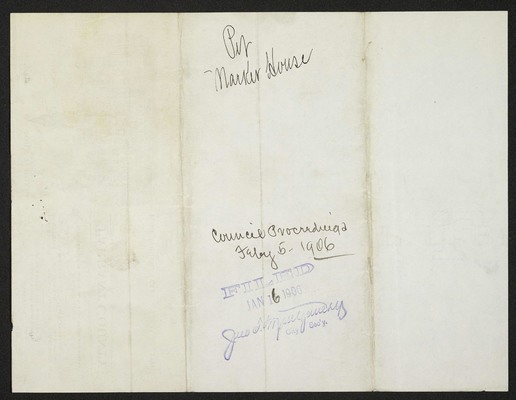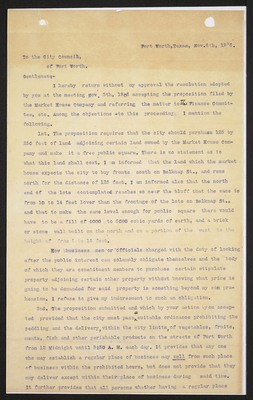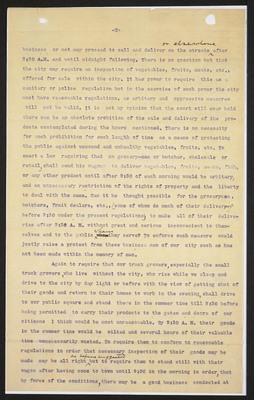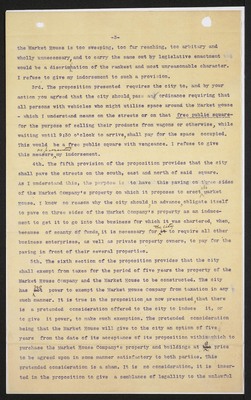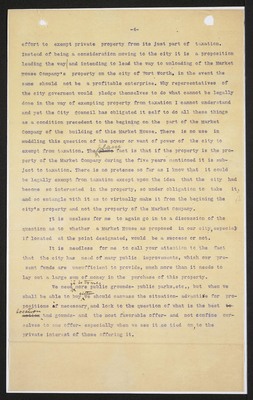Pages
37
Fort Worth,Texas, Nov.6th, 1906.
To the City Council, of Fort Worth.
Gentlemen:-
I hereby return without my approval the resolution adopted by you at the meeting Nov. 5th, 1906 accepting the proposition filed by the Market House Company and referring this matter to the Finance Committee, etc. Among the objections to this proceeding I mention the following.
1st. The proposition requires that the city should purchase 125 by 250 feet of land adjoining certain land owned by the Market House Company and make it a free public square. There is no statement as to what this land shall cost. I am informed that the land which the market house expects the city to buy fronts south on Belknap St., and runs north for the distance of 125 feet. I am informed also that the north end of the lots contemplated reaches so near the bluff that the same is from 10 to 14 feet lower than the frontage of the lots on Belknap St., and that to make the same level enough for public square there would have to be a fill of 4000 to 6000 cubic yards of earth, and a brick or stone wall built on the north and on a portion of the west to the height of 6 to 14 feet.
How business men or officials charged with the duty of looking after the public interest can solemnly obligate themselves and the body of which they are constituent members to purchase certain stipulate property adjoining certain other property is something beyond my com prehension. I refuse to give my indorsement to such an obligation.
2nd. The proposition submitted and which by your action you accepted provided that the city must pass a suitable ordinance prohibiting the peddling and the delivery, within the city limits, of vegetables, fruits, meats, fish and other perishable products on the streets of Fort Worth from 12 Midnight until 9:30 A. M. each day. It provides that any one who may establish a regular place of business may sell from such place of business within the prohibited hours, but does not provide that they may deliver except within their place of business during said time. It further provides that all persons having a regular place
38
-2-
business or not may proceed to sell and deliver on the streets or elsewhere after 9:30 A.M. and until midnight following. There is no question but that the city may require an inspection of vegetables, fruits, meats, etc., offered for sale within the city. It has power to require this as a sanitary or police regulation but in the exercise of such power the city must have reasonable regulations, as arbitary and oppressive measures will not be valid. It is not my opinion that the court will ever hold there can be an absolute probition of the sale and delivery of the products contemplated during the hours mentioned. There is no necessity for such prohibition for such length of time as a means of protecting the public against unsound and unhealthy vegetables, fruits, meats, fish, or any other product until after 9:30 of each morning would be arbitary and unnecessary restriction of the rights of property and the liberty to deal with the same. Can it be thought possible for the grocerymen, butchers, fruit dealers, etc., (some of whom do much of their delivering before 9:30 under the present regulations) to make all of their deliveries after 9:30 A. M. without great and serious inconvenient to themselves and to the public who whom they serve? To enforce such measure would justly raise a protest from these business men of our city such as has not been made within the memory of man.
Again to require that our truck growers, especially the small truck growers, who live without the city, who rise while we sleep and drive to the city by day light or before with the view of getting shut of their goods and return to their homes to work in the evening, shall drive to our public square and stand there in the summer time till 9:30 before being permitted to carry their products to the gates and doors of our citizens I think would be most unreasonable. By 9:30 A. M. their goods in the summer time would be wilted and several hours of their valuable time unnecessarily wasted. To require them to conform to reasonable regulations in order that necessary inspection of their goods may be made may be all right as before suggested but to require them to stand still with their wagon after having come to town until 9:30 in the morning in order, that by force of the conditions, there may be a good business conducted at
39
-3-
the Market House is too sweeping, too far reaching, too arbitary and wholly unnecessary, and to carry the same out by legislative enactment would be a discrimination of the rankest and most unreasonable character. I refuse to give my indorsement to such a provision.
3rd. The proposition presented requires the city to, and by your action you agreed that the city should, pass an ordinance requiring that all persons with vehicles might utilize space around the Market House - which I understand means on the streets or on that free public squarefor the purpose of selling their products from wagons or otherwise, while waiting until 9:30 o'clock to arrive, shall pay for the space occupied. This would be a free public square with vengeance. I refuse to give this measure as presented my indorsement.
4th. The fifth provision of the proposition provides that the city shall pave the streets on the south, east and north of said square. As I understand this, the purpose is to have this paving on three sides of the Market Company's property on which it proposes to erect its Market House. I know of no reason why the city should, in advance, obligate itself to pave on three sides of the Market Company's property as an inducement to get it to go into business for which it was chartered, when, because of scanty of funds, it is necessary for it the city to require all other business enterprises, as well as private property owners, to pay for the paving in front of their several properties.
5th. The sixth section of the proposition provides that the city shall exempt from taxes for the period of five years the property of the Market House Company and the Market House to be constructed. The city has not no power to exempt the Market House Company from taxation in any such manner. It is true in the proposition, as now presented, that there is a pretended consideration offered to the city to induce it, or to give it power, to make such exemption. The pretended consideration being that the Market House will give to the city an option of five years from the date of its acceptance of its proposition within which to purchase the Market House Company's property and buildings at the a price to be agreed upon in some manner satisfactory to both parties. This pretended consideration is a sham. It is no consideration, it is inserted into the proposition to give a semblance of legallity to the unlawful
40
-4-
effort to exempt private property from its just part of taxation. Instead of being a consideration moving to the city it is a proposition leading the way and intending to lead the way to unloading of the Market House Company's property on the city of Fort Worth, in the event the same should not be a profitable enterprise. Why representatives of the city government would pledge themselves to do what cannot be legally done in the way of exempting property from taxation I cannot understand and yet the City Council has obligated it self to do all these things as a condition precedent to the begining on the part of the Market Company of the building of this Market House. There is no use in muddling this question of the power or want of power of the city to exempt from taxation. The plane plain fact is that if the property is the property of the Market Company during the five years mentioned it is subject to taxation. There is no pretense so far as I know that it could be legally exempt from taxation except upon the idea that the city had become so interested in the property, so under obligation to take it, and so entangle with it as to virtually make it from the beginning the city's property and not the property of the Market Company.
It is useless for me to again go in to a discussion of the question as to whether a Market House as proposed in our city, especialy if located at the point designated, would be a success or not.
It is needless for me to call your attention to the fact that the city has need of many public improvements, which our present funds are unsufficient to provide, much more than it needs to lay out a large sum of money in the purchase of this property.
We need, it is true, more public grounds- public parks, etc., but when we shall be able to buy either we should canvass the situation- advantise for propositions if necessary, and look to the question of what is the best to action location and gounds- and the most favorable offer- and not confine ourselves to one offer- especially when we see it so tied on, to the private interest of those offering it.
